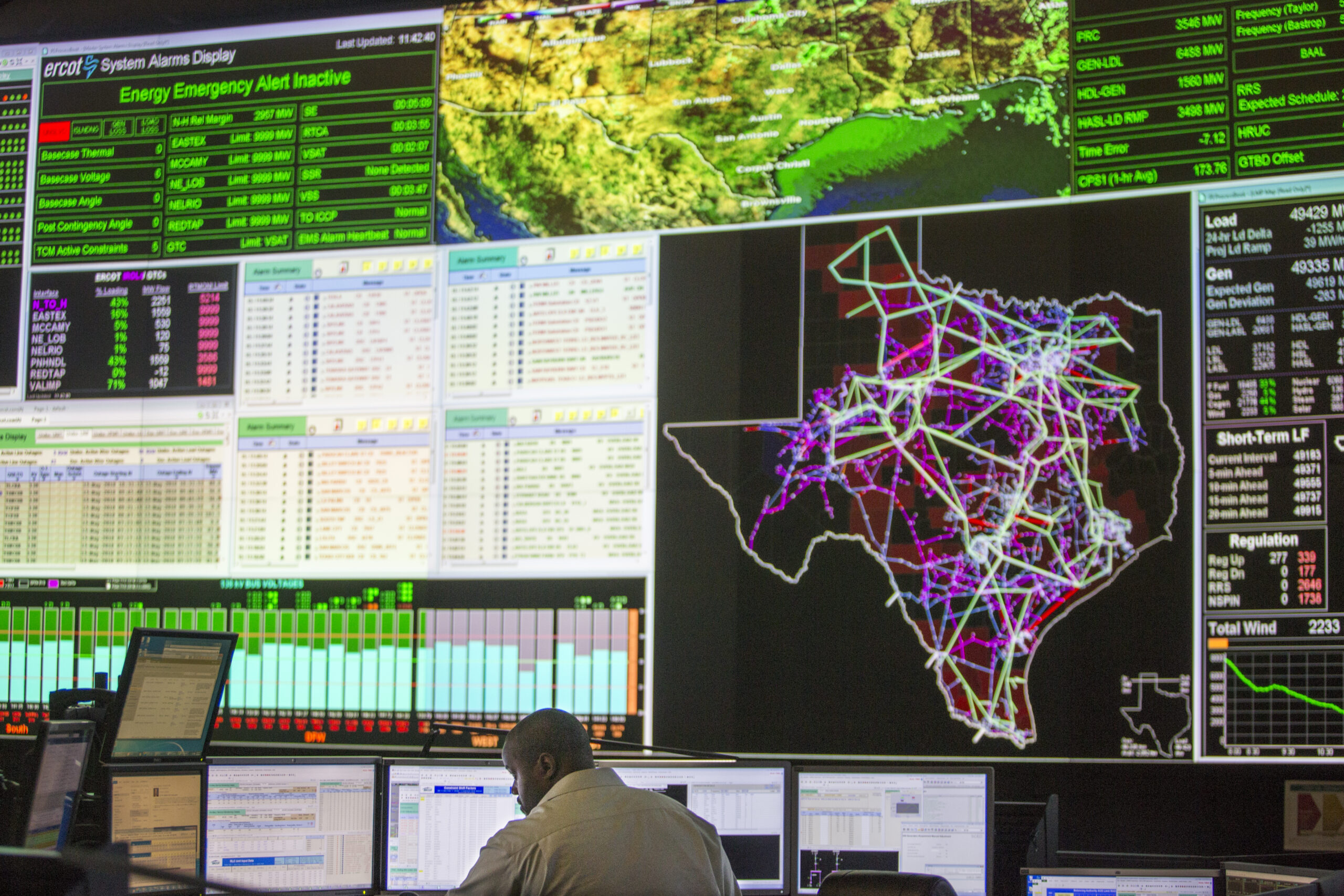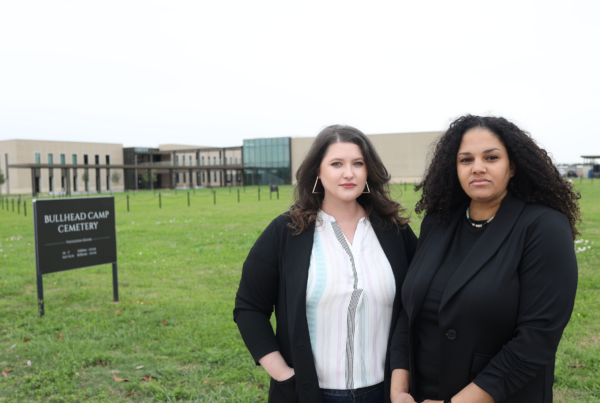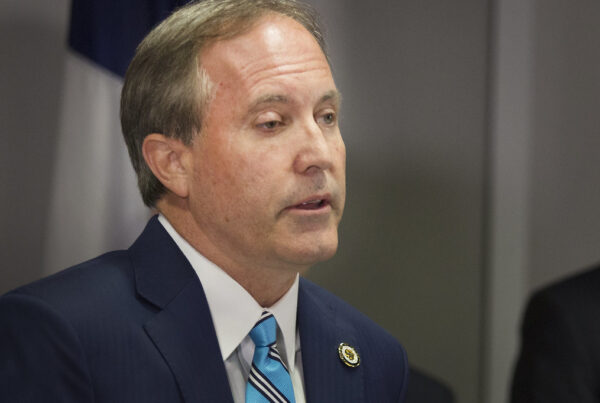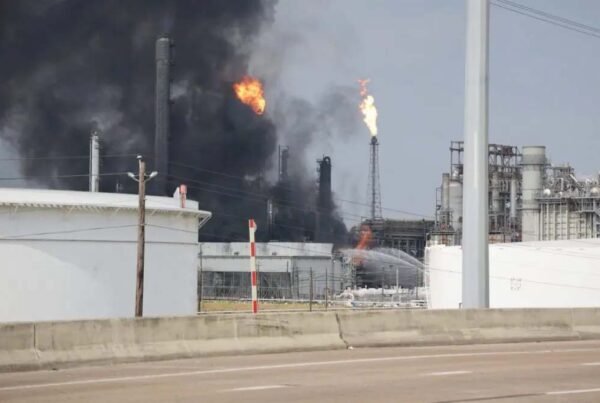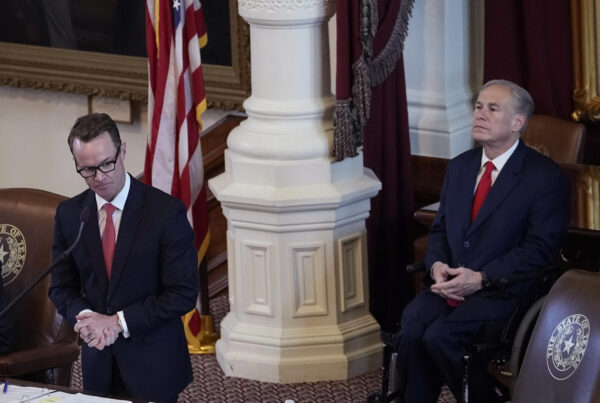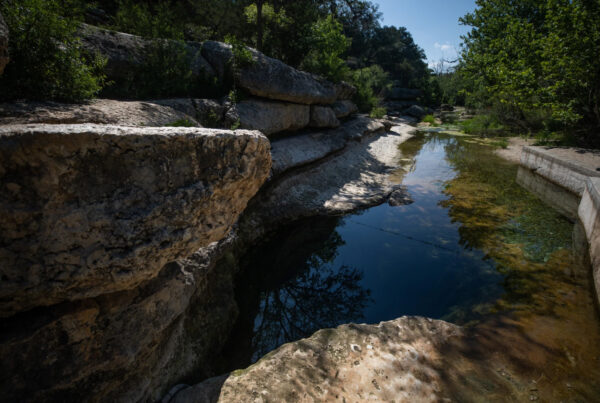With triple-digit temperatures on the horizon in much of Texas, many are wondering how the state’s electric grid will hold up.
The Electric Reliability Council of Texas, or ERCOT, expects record-high energy usage over the next few days. The agency launched a “weather watch” earlier this week, telling Texans to be aware of how much power they use.
Doug Lewin, author of the Texas Energy and Power newsletter and host of the Texas Power Podcast, spoke to Texas Standard about the factors that will affect the grid’s reliability. Listen to the story above or read the transcript below.
This transcript has been edited lightly for clarity:
Texas Standard: So with everyone’s A/C working overtime during this heat wave, are the lights going to stay on or not? What’s your take?
Doug Lewin: So I think, yes, I think there is a low likelihood of outages. The three things that you want to look for as far as the sort of, you know, indicators of whether or not there’s going to be an outage: One is – and you really need to check all three of these boxes to to end up in an outage situation typically – and that would be high demand. So we’ve got that. It looks like we’re going to break some records and that’s not a good thing, right? A lot of times you break a record, you’re like, “that’s great.”
We’re not managing the peak real well and we can talk about that. You look for thermal outages and by that we just mean gas, coal and nuclear plants – those are unfortunately a little bit elevated right now. If we were talking the last couple of days, I’d say they’re kind of in the normal range, but they’re actually up this morning to almost 9000 megawatts. It’s a little bit concerning.
But the third factor is wind and solar and wind and solar look to be particularly strong over the next week or so. So there should be enough from those to sort of overcome the thermal outages. ERCOT puts a typical level of thermal outages at 5000 megawatts and a high level at about 8500. And right now we’re at about 8800. So yeah, it’s that high level and that’s a little concerning.
So we’re having to lean on renewables a whole lot more right now to try to bridge us over. Do I understand you correctly?
Well, I mean, thermal power plants are still going to play a huge role heading through this next week. There’s absolutely no doubt about that and hopefully what’s going on – you know, ERCOT doesn’t talk about this stuff nearly enough, in my opinion – hopefully what’s going on is they are fixing those plants up, maybe taking some of them offline to do some last minute repairs because demand is not quite as high today as it’s going to be tomorrow. And there is enough wind and solar, so it doesn’t look like there’s going to be too much scarcity today. So hopefully they’re pulling those plants offline to get them into tip-top shape. But without any communication from ERCOT, we don’t know whether they’re broken and not coming back or just being taken off for a minute to get ready.
I guess that’s got me scratching my head. I’m sure a lot of other Texans are feeling the same way: “we’ve been here before.” It’s not like this is a novel idea that, you know, there would be some repairs necessary. So even the thought going into summer, knowing what we know about Texas, that there might still need to be some repairs done sort of at the last minute on the fly… how’s that a thing?
So you know, thermal plants, they’re very, very complicated, right? I mean, they’re engineering marvels. There’s a lot of moving pieces, literally. And so, you know, they have an outage season. And that outage season is typically what they call “shoulder months,” like April and May or, you know, October, November, when you’re not going to see extremes of heat or cold. Of course, the problem is with climate change, those shoulder seasons are being squeezed down. You know, if you remember last year in May, we had a horrific heat wave and there were conservation alerts made, and it was because there were so many thermal plants on outage and several more of them broke.
And that downtime window sort of narrows, but of course since that big freeze in February of 2021, there’s been a big focus on what lawmakers need to do. Has the Legislature done enough, in your view, to deal with these power issues so that when we face these major weather events, many of them foreseeable, we’re not going to be having outages on the scale of what we saw back in 2021?
They have not. And the biggest glaring gap in what they have done is on the demand side, particularly on energy efficiency. We are a very energy-inefficient state. We are among the worst states in the country as far as the amount of potential energy efficiency that we have achieved. And that’s one of the reasons you’re seeing these really high peaks. There’s no doubt that a lot of people moving here and the state growing is the biggest driver of that.
I definitely want to acknowledge that reality and that truth, a major factor on the very short list is also a lack of energy efficiency and a lack of sort of what I like to call “energy optimization” – really optimizing the way we use energy to manage that peak. So just to give one example, we could be telling people throughout Texas, “go ahead and make your homes colder in the morning and at midday,” because if you go to that ERCOT dashboard and you look at the available capacity, there is so much in the morning and at midday that we’re nowhere close to being near the edge. It’s only in the late afternoon and evening hours where it gets close at all. So, people could pre-cool and then they need less cooling in the evening. That would be better. Even better than that would be to help people change out their HVACs to get high-efficiency heat pumps that use less energy both in the summer and the winter at these peak times. So that’s the biggest glaring weakness right now.
When you talk about that messaging, what would you recommend people do to moderate their electricity usage over the next few days to help us get through this current heat wave?
Well, I mean, I think it would be a mistake to just put this on the individual. I mean, that’s one of my problems with these conservation calls. I think asking Texans just to, you know, sweat inside their homes and things like that is not a great solution if people want to be helpful. I do think making, literally making their house colder in the morning and midday is a great way to go. The problem with that, of course, is if you don’t have a well-insulated home, your house is going to get hot really quick in the afternoon anyway. So what we need is more systematic and programmatic fixes to this.
A strategic approach that deals with the demand side.
That’s right. And there needs to be a policy push behind it. Markets and technology will take care of a lot of it. I’ll give you an example. So right here in Texas, a company called Daikin is manufacturing high-efficiency heat pumps. These heat pumps will use, you know, something like half the energy of a regular sort of system or furnace. Again, the heat pumps can do heating and cooling, so you don’t need the HVAC outside your house and the furnace, so it’s a much more efficient way to go.
There’s a lot of states that are incentivizing the purchase of those. So, they’re manufacturing it here in Texas and sending them out of the state. And it’s not that nobody’s installing heat pumps here. I would encourage people, if your HVAC is getting close to going out, you know, looking to replace it with a high-efficiency heat pump. But you’re going to have a hard time finding incentives here in the state of Texas. Austin Energy and CPS Energy do some, you know, rebates in other parts of the state, but they’re just very small. They typically run out. We should be incentivizing those to cover the delta.
So if your regular HVAC was going to cost $5000 and the heat pumps $5500, you get an incentive for that $500 to the customers so they’re not, you know, having to spend extra. And then everybody benefits and our system doesn’t have as much drain. So we need more systematic approaches like that than just sort of begging people to reduce their usage when things are getting tight.
So, Doug, here we are just getting into the hottest part of the summer. Aside from the next few days, assuming we don’t have rolling blackouts and all of that, it sounds like there’s not an enormous risk of that, although it’s something to watch. What are we looking at for the rest of the summer? Are we going to be able to make it through this summer without major blackouts?
Like so much else in life, it all depends on the weather. I mean, I think of that situation two summers ago when it was 116 degrees and you get a situation like some kind of heat dome sits down over multiple metro areas in our state then, you know, it is highly likely under a scenario like that that there would be outages.
Now, I would say to your listeners, it’s a different situation to have an outage in the summer than it is in the winter. It’s not going to last for days. If you had rolling outages, you’re talking half an hour/an hour, because demand drops pretty quick when night comes around. And again, like even in those kinds of situations, we would have either enough capacity or nearly enough capacity if the thermal plants are operating well.
And of course, the problem is like with so much with climate change, it’s these kind of compounding effects, right? You get this really hot weather and the heat not only causes demand to go up, it just wreaks havoc on so much, including the equipment in the power plant. So, you tend to see thermal power plants break more the hotter it gets. You get a little bit of a drain on your solar plants in the heat. You know, you sometimes get really still airs – you don’t get as much wind – but it’s those compounding factors that really could cause problems. So, I think, though, if we stay in this kind of zone we’re in right now of 100/105 degrees, knock on wood, I think we’ll be all right. It’s just the extreme heat, which with climate change is becoming more likely, that would cause me to have concern.


